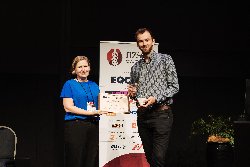UPDATE: Vodafone NZ back in black in hotly contested market
UPDATE: Vodafone NZ back in black in hotly contested market
By Paul McBeth
Aug. 21 (BusinessDesk) - Vodafone New Zealand's books were back in the black after three years in the red as the country's biggest mobile operator boosted revenue in an increasingly competitive telecommunications sector.
Auckland-based Vodafone reported a profit of $57.5 million in the 12 months ended March 31, turning around a loss of $18.3 million a year earlier, financial statements lodged with the Companies Office show. Revenue edged up 2.8 percent to $2.05 billion, with a 2.7 percent increase in cost of sales to $979.5 million. The bottom line was buoyed by 72 percent slide in net finance costs to $41.8 million, which largely come from related party loans owed to its UK parent, which totalled about $1.01 billion as at March 31, down from $1.15 billion a year earlier.
Earnings before interest, tax, depreciation and amortisation rose 8 percent to $423.3 million, beating the 3 percent increase in arch-rival Spark New Zealand's 3 percent ebitda gain to $1.02 billion in the June year reported last week. Vodafone's ebitda margin widened to 20.7 percent from 19.6 percent a year earlier, but is lagging behind Spark's 28 percent.
"The enterprise business performed very well," chief executive Russell Stanners told BusinessDesk. "It's a pleasing set of results: we're back to growth, back to profit, we saw the P&L (profit and loss) perform pretty well and there was ebitda growth."
Spark chief executive Simon Moutter said New Zealand's biggest telecommunications company was targeting three areas to fatten earnings margins to more than 30 percent by 2020 in an environment where customers were chasing the cheapest option, while at the same time regulated prices for wholesale network access have sapped the profitability for internet service providers.
Vodafone's Stanners said retailers always want cheaper wholesale prices, but that New Zealand's regulatory settings compared "far more favourably for retailers and consumers" than other jurisdictions.
Stanners said telecommunications market is "very competitive" with a growing number of "no frills" internet service providers adding to the "significant price pressure on all the time".
To counter that, Stanners said Vodafone is focusing on network performance and customer experience, which has seen the country's biggest mobile operator and second biggest internet service provider named the 2017 Ookla speed test winner, while increased use of the company's app has cut customer calls to its call centre by 15 percent.
Earlier this year, Vodafone Group noted New Zealand's service revenue increased 0.8 percent in the year "with strong fixed performance and mobile customer growth across both consumer and enterprise". More recently, the global telecommunications firm said its New Zealand business posted a 0.3 percent decline in service revenue to 286 million euros in the three months ended June 30.
Vodafone New Zealand took on debt to acquire TelstraClear from Australia's Telstra for $840 million in 2012, saying at the time it expected to reap savings by stripping out doubled-ups and using TelstraClear's backhaul and transmission network. It has since acquired internet-based telecommunications business WorldxChange and this year took a controlling stake in TeamTalk's rural internet services provider Farmside.
The local unit of the global telecommunications giant had sought to build the country's biggest telecommunications and media group in a merger with Sky Network Television, but was batted away by the Commerce Commission which deemed the tie-up would centralise too much power into the entity. The companies have since given up on appealing the decision, instead looking for ways to develop their existing commercial relationship.
Vodafone's depreciation charge rose 5.7 percent to $217.8 million, of which $202 million was on Vodafone's communication and network equipment. That network and equipment had a book value of $895.3 million as at March 31, including an increase of $174.8 million from work that had been previously recognised as construction in progress.
The company's amortisation charge shrank 22 percent to $105.6 million of which $78.8 million was on intangible software assets.
(BusinessDesk)


 John Mazenier: Gaffer Tape And Glue Delivering New Zealand’s Mission Critical Services
John Mazenier: Gaffer Tape And Glue Delivering New Zealand’s Mission Critical Services Earthquake Commission: Ivan Skinner Award Winner Inspired By Real-life Earthquake Experience
Earthquake Commission: Ivan Skinner Award Winner Inspired By Real-life Earthquake Experience Reserve Bank: Consultation Opens On A Digital Currency For New Zealand
Reserve Bank: Consultation Opens On A Digital Currency For New Zealand NIWA: Ship Anchors May Cause Extensive And Long-lasting Damage To The Seafloor, According To New Research
NIWA: Ship Anchors May Cause Extensive And Long-lasting Damage To The Seafloor, According To New Research New Zealand Customs Service: A Step Forward For Simpler Trade Between New Zealand And Singapore
New Zealand Customs Service: A Step Forward For Simpler Trade Between New Zealand And Singapore Horizon Research: 68% Say Make Banks Offer Fraud Protection
Horizon Research: 68% Say Make Banks Offer Fraud Protection



